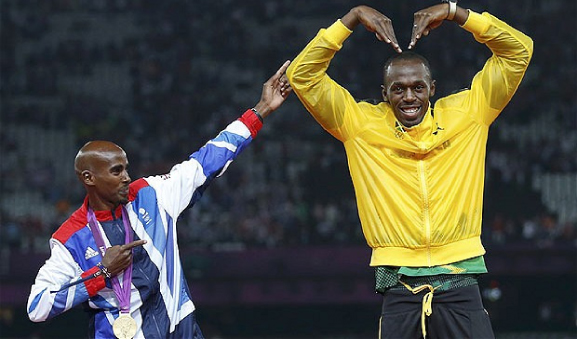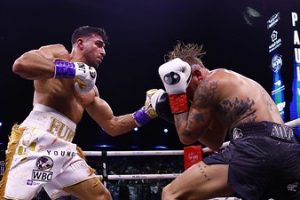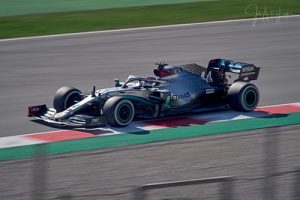gair rhydd sport reviews the sporting drama of the London 2012 Olympics and its impact on the country as a whole.
Of all the articles written in the past few weeks, the best description of the Olympics was written in an article I read on the first Saturday. As the BBCÔÇÖs Tom Fordyce said, ÔÇ£being at an Olympics can sometimes feel like the best house party in the world: even as you’re having an absolute blast, there’s always a nagging sense that something even better might be happening in another room just down the hall.ÔÇØ
But now, the sporting extravaganza is all over, leaving us all with Olympic hangovers. By the time youÔÇÖre reading this, even the Paralympics will be over. WeÔÇÖre left with memories, sporting history, and a legacy that is yet to be defined.
My favourite moment of the whole Games is one that did not even happen on the field of play, or, to be more accurate, on the water. It was when (Sir?) Ben Ainslie uttered the fantastic quote, ÔÇ£theyÔÇÖve made a big mistake… theyÔÇÖve made me angry, and you donÔÇÖt want to make me angry.ÔÇØ In a Games where every interviewee said, ÔÇ£it was fantastic, the crowd were amazing, IÔÇÖm so proud, it has been hard workÔÇØ (all probably true, but still banal), Ainslie spoke with an ominous tone and fire in the eyes in a way that was a complete opposite to the self-effacing and unflustered facade that you saw after he had the gold medal around his neck. After he said that now famous quote, he was as sure to win the gold medal as the British relay team was to mess up a baton change. Ainslie seems to take everything in his stride and exudes the ‘keep calm and carry on’ persona that has allowed him to rule the waves for Britannia.
Everyone will have a different favourite moment, which is exactly why the Olympics are so special. ItÔÇÖs a unique smorgasbord of sporting excellence that carried the whole nation on the crest of a sporting wave.
As any lover of sport will tell you, having wall-to-wall sport on television, radio, and in the paper, made for 19 days of utopian proportions. But this is not just because we love sport. ItÔÇÖs much more than that. Sport is in the media all the time now anyway. The best part was that 26 sports had their time to shine. Only during this fortnight and a bit can a gold medal in running equal fencing and shooting the same as swimming and show jumping. And put those sports together and you get the eclectic mix of the modern pentathlon.
The more eagle-eyed of you will spot that I said 19 days of sport, but this wasnÔÇÖt an error. To say that it was 16 days of sport would do a disservice to the football event, at which there were 11 games, including a bronze medal match, and two near-sell-out Great Britain games, at the Millennium Stadium. Now, I may be slightly biased as I was an ‘Ambassador’ (posh way of saying ÔÇÿvolunteerÔÇÖ) for the football in Cardiff, but I think football played a terrific role in the Olympics.
Football provides a brilliant opportunity for some other parts of the country to experience some Olympic fever. What other event could have action in London, Cardiff, Coventry, Glasgow, Manchester and Newcastle. The pinnacle of football and tennis might not be the Olympics, but they played their part with decorum, and seeing Andy Murray sing God Save the Queen was one of my highlights of the whole Olympics. It once again proved that sport is a greater unifier than any political summit or trade agreement.
It would take a whole newspaper to cover all the stories involved. Every day had enough news to fill a week. Even now, as I write this a day after it has all ended, the opening ceremony seems like an age ago. Bradley WigginsÔÇÖ gold? That could have been months ago. But it wasnÔÇÖt. All of BritainÔÇÖs 65 medals were squeezed into just over two weeks. As we were often told, our 29 gold medals was the best performance since 1908. And it was all sandwiched between two breathtaking ceremonies: an opening ceremony with the most interesting economic history lesson youÔÇÖre ever likely to come across, and a closing ceremony that perfectly told the world what itÔÇÖs like to be British. BrazilÔÇÖs part may not have ignited my excitement for Rio 2016, but then again, LondonÔÇÖs ten minutes at the closing ceremony in Beijing wasnÔÇÖt much to shout about either.
Praise was lavished on London from all quarters. The volunteers had glowing reports, and it is no surprise. My good friend, Stephanie ÔÇ£BirdyÔÇØ Bird was one of the 70,000 Games Makers, and the multiple training days she and her colleagues went on in London, and careful planning for their roles, obviously paid off. As well as volunteersÔÇÖ broad grins, the weather mostly smiled on us, the G4S debacle didnÔÇÖt prove as apocalyptic as thought, only one gold medalist has been caught using drugs (at time of print), and the empty seat fiasco was quelled after the first few days. On the various fields of play, Michael Phelps became the most decorated Olympian of all time, unknown British Olympians Greg Rutherford and Peter Wilson became the centre of attention in their finest hour, and Usain Bolt was on his own planet. BritainÔÇÖs Alistair Brownlee went through 1 hour and 46 minutes of hell to swim, cycle and run to the finish line, winning the holy grail of a triathlon gold medal. Bolt, for a combined total work of less than 100 seconds (including qualifying rounds), walked away with a cool three gold medals. It pays to be quick, eh?!
Sport showed why we love it so much. Yes, there were bumps. Badminton players treaded the murky line between sportsmanship and cheating, commentators infuriated me by using ÔÇ£medalÔÇØ as a verb, and Taoufik Makhloufi won the 1500m after being diqualified – then reinstated – for not trying in the 800m. But these were outweighed by the mass of heart-warming, emotional stories that we were all carried along for. As John Inverdale put it, ÔÇ£sometimes you love sport, sometimes you hate it… but basically, you love itÔÇØ. Have truer words ever been spoken?
In a week or so, I will be immersed in the new football season, getting excited for the Ryder Cup, and it wonÔÇÖt be that long until the Autumn Internationals will start at the Millennium Stadium. And before the next Olympics, there will be the 2014 Commonwealth Games in Glasgow, Winter Olympics in Sochi, Russia, and also in Russia will be the World Athletics Championships in Moscow, not to mention the 2015 Rugby World Cup in England and 2014 FIFA World Cup in Brazil. Having said all that, thereÔÇÖs only 1,417 days until Rio. Not that IÔÇÖm counting or anything…





Add Comment